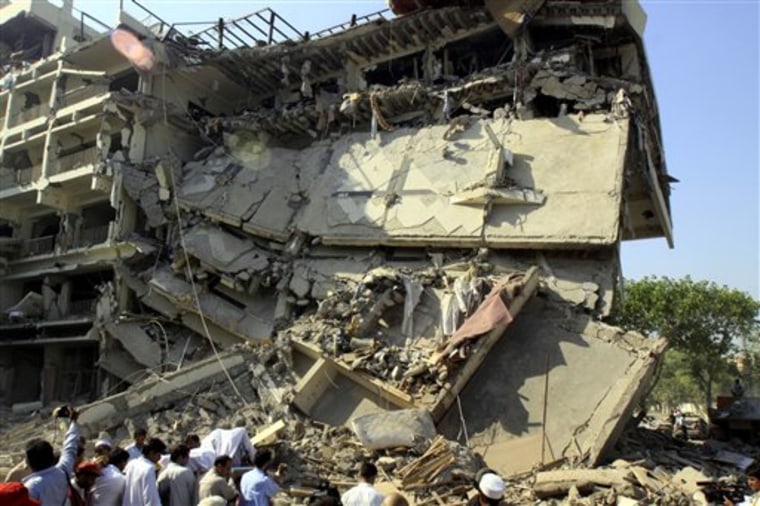Pakistani officials moved swiftly Wednesday to use the suicide bombing of a luxury hotel in their campaign to build public support for military offensives against the Taliban, saying the country is at war.
Past offensives against Islamist militants have resulted in backlashes as many Pakistanis concluded the only way to end the bloodshed and destruction was for the weak central government to strike a deal with the extremists — which it did as recently as this past spring in the Swat Valley, only to have an emboldened Taliban violate the agreement by seizing an adjacent district.
"This is a war, but the people of this country will not bow to the cowardly acts of terrorists. People are now seeing the real face of those who have been exploiting them in the name of Islam," North West Frontier Province senior minister Bashir Ahmad Bilour Bilour told reporters.
'They cannot break us'
Tuesday's attack on the Pearl Continental hotel in Peshawar killed at least nine people, a week after the Taliban threatened major attacks in large cities to avenge an army offensive to reclaim Swat.
"We will fight this war 'til our last breath," Bilour said. "They cannot break us. The whole nation is united."
Pakistan Information Minister Qamar Zaman Kaira used the same language: "The whole nation is united and backing the government and army in the fight against terrorists," he said in a statement.
That is an overstatement, at least in the rugged, lawless tribal belt where the Taliban and al-Qaida have carved out a sanctuary of entrenched strongholds with at least tacit blessings from tribal elders.
Still, interviews with people on the streets of Pakistan's three largest cities — Peshawar, Karachi and Lahore — found nothing but contempt for the Taliban.
Mohammad Zubair, 32, a human resources employee at a Lahore construction company, called the Islamic militants "a mafia of criminals."
"They do not have anything to do with Islam. They are just exploiting our religion to mislead our youth," he said. "They are killing innocent people. They deserve death wherever they are."
Is Taliban support waning?
Moosa Ahmad, 40, a shopkeeper in Karachi, said he did not want such attacks on urban civilian targets to deter the army from pursuing the Taliban.
"These strikes should not make any difference, and the government must expedite its offensive," he said. "They should be chased wherever they are and wherever they go."
Tariq Khan, 26, a Peshawar teacher, lamented that the blast killed two U.N. workers — one from Serbia, the other from the Philippines — and wounded four others.
"They were helping us, and what we gave them was death, wounds and fear," Khan said. "I am sure that such attacks will only serve for more hatred and more opposition to those involved in these terrorist attacks."
Hasan-Askari Rizvi, a political and defense analyst, said overall sentiment is more nuanced. Nevertheless, he said it appears that the Taliban's support is waning.
"Among ordinary Pakistanis, the state of mind is changing only to the extent that they are more afraid. And now what do you do after being afraid?" Rizvi said.
"Some people will start saying stop the operations and others will argue that you should take firm action against them. While ordinary people might sometimes have contradictory thinking, overall I would say the balance is tilting against the Taliban."
Death toll
Investigators searched Wednesday through debris at the Pearl hotel, where about two dozen U.N. workers were staying when the bomb went off.
Security camera footage shows at least three attackers in two vehicles: a white sedan and a small truck. The vehicles pull up to a guard post outside the hotel, with the car in front. A puff of smoke appears near the car window. A guard collapses, apparently shot. The vehicles move into the hotel compound. A flash and eruption of dust follow seconds later.
The truck was carrying more than half a ton of explosives, senior police officer Shafqatullah Malik estimated.
The exact death toll remained elusive Wednesday.
While some media reports said up to 19 people were killed, North West Frontier Province Information Minister Mian Iftikhar Hussain told reporters that officials had only been able to confirm 11 or 12 dead, including two or three sets of remains that are believed to be from the attackers.
Peshawar district coordination officer Sahibzada Anis also said nine people were killed in addition to the attackers.
"The inflated figure which I am also hearing from different channels is not accurate," he told The Associated Press.
Peshawar, with a population of 2.2 million people, is the largest city in Pakistan's troubled northwest.
Battling militants in Jani Khel
Elsewhere in the region, security forces killed 70 suspected militants in the Bannu district near the Swat Valley, two intelligence officials told the AP.
The operation began Tuesday after tribal elders failed to move against militants in their midst who allegedly helped kidnap more than 100 students, who were later freed.
The intelligence officials said troops, backed by helicopter gunships and artillery, attacked the Jani Khel section of Bannu. They spoke on condition of anonymity because they were not authorized to speak to the media. It was not possible independently to confirm that toll because the region is remote and dangerous.
Bannu is near both South and North Waziristan, two major strongholds for al-Qaida and the Taliban. Any offensive after Swat is expected to start in South Waziristan, though the military has not confirmed any plans.
In the northwest's Upper Dir region, meanwhile, a handful of paramilitary troops joined a tribal militia pursuing Taliban fighters in retaliation for a suicide bombing on a mosque. Hundreds of tribesmen have been battling the militants since Saturday.
